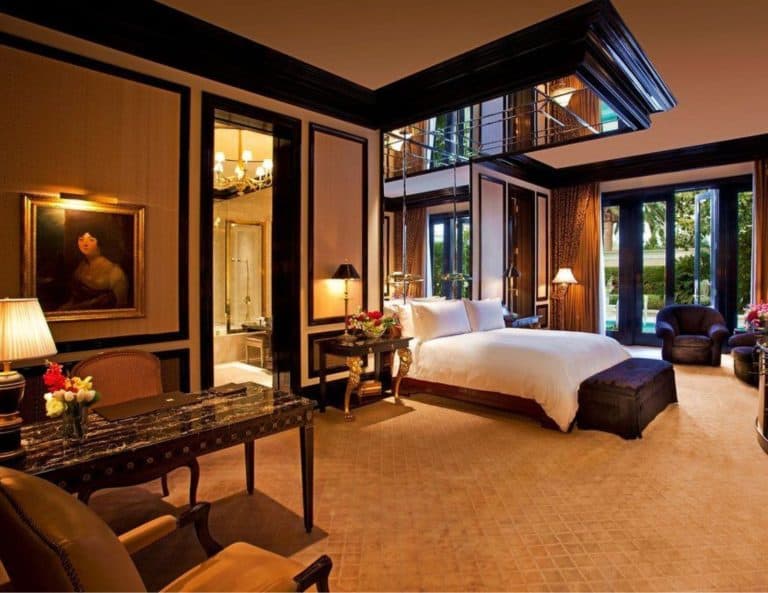Discover the fascinating history of hotels and how they have evolved over time.
If you’re short on time, here’s a quick answer to your question: The first hotel was built in the ancient city of Uruk, Mesopotamia, around 3200 BCE, providing a place for travelers to rest and refresh.
In this article, we will explore the origins of hotels, their transformation throughout history, and the modern-day hospitality industry.
From humble beginnings to luxurious accommodations, hotels have played a crucial role in facilitating travel and providing comfort to guests.
Ancient Origins: The Birth of Hospitality
The concept of hospitality has been around for thousands of years, with ancient civilizations laying the foundation for what would eventually become the modern hotel industry. Let’s take a journey back in time to explore the origins of hospitality and the earliest forms of accommodations.
The first hotel: Uruk, Mesopotamia
Believe it or not, the world’s first hotel dates back over 4,000 years to the ancient city of Uruk in Mesopotamia (modern-day Iraq). This impressive establishment, known as the “Inn of the Lion,” catered to weary travelers and provided them with a place to rest, eat, and socialize.
According to historical records, the Inn of the Lion offered various amenities, including comfortable beds, meals, and even entertainment in the form of music and dancing. It was a hub of activity and a vital stopover for travelers traversing the ancient trade routes.
Early accommodations in ancient civilizations
While the Inn of the Lion is often considered the first hotel, it’s worth mentioning that other ancient civilizations also had their own versions of accommodations. In Egypt, for example, travelers could find lodging in temples or guesthouses near important religious sites.
Similarly, in ancient Greece, travelers could seek shelter in private homes or establishments known as “xenones.” These xenones provided not only a place to sleep but also a chance for travelers to socialize and exchange stories with fellow wanderers.
Hospitality in the Roman Empire
The Roman Empire took hospitality to a whole new level. Romans were known for their grandiose accommodations, with luxurious villas and guesthouses scattered throughout the empire. These establishments, called “hospitia” or “hospitium,” were often located near major roads and offered a wide range of amenities.
Travelers in the Roman Empire could expect comfortable beds, hot baths, and even fine dining options. The Romans understood the importance of hospitality in maintaining their reputation and attracting influential visitors.
It’s fascinating to see how the concept of hospitality has evolved over time. From the humble Inn of the Lion to the opulent villas of the Roman Empire, each era has contributed to shaping the modern hotel industry that we know today. Whether you’re staying in a cozy bed and breakfast or a luxurious five-star hotel, it’s all thanks to the ancient origins of hospitality.
Medieval Inns and Monastic Hospices
The Rise of Inns in Medieval Europe
In medieval Europe, travel was often a perilous and arduous undertaking. As trade and commerce thrived, the need for safe and comfortable accommodations for weary travelers became apparent. This led to the rise of inns, which provided a place for travelers to rest, eat, and socialize. Inns were typically located along well-traveled routes, such as major highways or near important trading centers. They offered a range of services, including lodging, stables for horses, and meals.
The development of inns in medieval Europe was driven by a growing demand for hospitality services. The influx of merchants, pilgrims, and diplomats created a need for secure and reliable places to stay. Inns provided a sense of safety and comfort, offering travelers respite from the challenges of the road. They played a crucial role in facilitating trade and fostering cultural exchange during this period.
Religious Orders and Their Role in Hospitality
Religious orders, particularly monastic communities, also played a significant role in providing hospitality during medieval times. Monastic hospices were established to offer shelter and sustenance to travelers, especially pilgrims en route to religious sites. These hospices were often attached to monasteries or abbeys and were run by monks or nuns.
The religious orders saw hospitality as an integral part of their mission to serve others. They believed in the importance of offering a warm welcome and meeting the needs of those on a journey. Monastic hospices provided not only a place to rest and eat but also spiritual guidance and a sense of community.
The establishment of monastic hospices had a profound impact on the development of hospitality practices. These institutions set high standards for cleanliness, comfort, and service. They also pioneered innovations such as separate sleeping quarters, communal dining halls, and the provision of clean linens.
The legacy of medieval inns and monastic hospices can still be seen in modern hospitality practices. The concept of providing a welcoming and comfortable environment for travelers has remained a central tenet of the hotel industry. Today, hotels strive to provide exceptional service and amenities to ensure that guests have a memorable and enjoyable stay.
For more information on the history of medieval inns and monastic hospices, you can visit Britannica.com or History.com.
The Renaissance and the Grand Tour
The Renaissance period, which spanned from the 14th to the 17th century, marked a significant shift in the development of hotels. During this time, the concept of luxury accommodations started to emerge, catering to the needs of the wealthy and elite. These early luxury hotels were often found in bustling cities such as Venice, Florence, and Rome, and were known for their opulent interiors, exquisite furnishings, and exceptional service.
The emergence of luxury hotels
As trade and commerce flourished during the Renaissance, wealthy merchants and nobles sought comfortable and luxurious accommodations during their travels. This demand led to the establishment of various luxury hotels, which offered amenities such as private bathrooms, lavish dining areas, and spacious bedrooms. One notable example is the “Grand Hotel” in Venice, which opened its doors in 1574 and quickly became a favorite among European nobility.
These luxury hotels not only provided a place to stay but also served as social hubs where guests could socialize, exchange ideas, and engage in cultural activities. They were often adorned with exquisite artwork, grand ballrooms, and lush gardens, creating an atmosphere of elegance and refinement.
The advent of the Grand Tour
During the 17th and 18th centuries, the Grand Tour became a popular cultural and educational journey undertaken by young aristocrats and intellectuals. This extended trip typically included visits to major cities across Europe, where travelers would stay in luxury hotels and immerse themselves in the local culture.
The Grand Tour was seen as an essential part of a nobleman’s education, providing exposure to the arts, history, and architecture. It was during this time that the demand for high-quality accommodations increased significantly. Luxury hotels along the Grand Tour route, such as the “Hotel d’Angleterre” in Geneva and the “Hotel de Russie” in Rome, became sought-after destinations for these affluent travelers.
These hotels offered not only comfortable lodgings but also organized guided tours, cultural events, and access to exclusive social circles. The Grand Tour experience was a transformative one, shaping the worldview and tastes of many young travelers and influencing architectural and artistic trends across Europe.
Today, the influence of the Renaissance and the Grand Tour can still be seen in the world of hospitality. Luxury hotels continue to provide exceptional service and amenities, while travelers seek immersive experiences that combine comfort and cultural exploration. The evolution of hotels from ancient times to modern hospitality is a testament to our ongoing desire for comfort, luxury, and the exploration of new horizons.
The Industrial Revolution and the Birth of Modern Hotels
The Industrial Revolution, which spanned from the 18th to the 19th century, brought about significant changes in various aspects of society, including travel and hospitality. As advancements in technology and transportation revolutionized the way people moved around, the need for accommodation during their journeys also increased. This led to the birth of modern hotels, marking a new era in hospitality.
The impact of the Industrial Revolution on travel
The Industrial Revolution brought forth major advancements in transportation, such as the steam engine and the railway system. This made travel faster, more convenient, and accessible to a larger number of people. As a result, tourism started to flourish, and more individuals began exploring new destinations. The increased mobility and desire to explore created a demand for places to stay during these journeys, leading to the emergence of hotels.
With the advent of steamships, long-distance travel became more efficient and comfortable. This innovation allowed people to travel across continents, leading to an influx of international travelers. As a result, hotels had to adapt to cater to the needs and preferences of a diverse clientele. The hospitality industry began to evolve rapidly, offering various amenities and services to accommodate the growing number of travelers.
The opening of the first modern hotels
One of the first modern hotels that emerged during this period was the Tremont House, which opened in Boston in 1829. It introduced several groundbreaking concepts that set the standard for future hotels. The Tremont House was the first hotel to offer private rooms with locks, indoor plumbing, and bellboys to assist guests. These innovations revolutionized the hotel experience and paved the way for further advancements in the industry.
Another notable example is the Grand Hotel in Brighton, England, which opened its doors in 1864. It was one of the earliest hotels to offer luxurious accommodations and amenities, including a grand ballroom and a hydraulic lift. The Grand Hotel set a new benchmark for opulence and hospitality, attracting affluent guests from around the world.
These pioneering hotels became the prototypes for modern hospitality establishments, inspiring others to follow suit. The Industrial Revolution not only transformed the way people traveled but also revolutionized the concept of accommodation, laying the foundation for the hospitality industry as we know it today.
For more information on the history of hotels and the impact of the Industrial Revolution on travel, you can visit https://www.hotelnewsresource.com/article104668.html.
The Golden Age of Hotels
The evolution of hotels has seen many remarkable periods throughout history, but none quite as glamorous and influential as the Golden Age of Hotels. This era, which spanned from the late 19th century to the early 20th century, marked a significant shift in the concept of hospitality and set the stage for the modern hotel industry as we know it today.
Luxury hotels and grand architecture
During the Golden Age of Hotels, luxury establishments emerged in iconic destinations around the world. These hotels were renowned for their opulence, grand architecture, and impeccable service. One such example is the Ritz Hotel in Paris, which opened its doors in 1898 and quickly became a symbol of elegance and sophistication. The Ritz boasted lavish accommodations, including spacious suites and exquisite dining options, attracting affluent travelers from all corners of the globe.
Another iconic hotel from this era is The Plaza in New York City. Built in 1907, The Plaza became synonymous with luxury and became a favorite among the elite and celebrities. Its breathtaking architecture and lavish interior design made it a true landmark of the city. Guests could indulge in fine dining, extravagant parties, and even take part in a game of croquet on the hotel’s private rooftop garden.
The birth of iconic hotel chains
Alongside the rise of luxury hotels, the Golden Age also witnessed the birth of iconic hotel chains that continue to dominate the industry today. One such example is Hilton Hotels, founded by Conrad Hilton in 1919. Hilton’s vision was to create a hotel chain that offered consistent quality and exceptional service, regardless of the location. This concept revolutionized the hospitality industry, paving the way for standardized amenities and services across multiple properties.
Another influential hotel chain that emerged during this period is Marriott International. Started by J. Willard Marriott in 1927, Marriott Hotels became known for their commitment to customer satisfaction and innovative business practices. Today, Marriott International is one of the largest hotel chains in the world, with properties in over 130 countries.
The Golden Age of Hotels left an indelible mark on the hospitality industry, shaping the way we experience and perceive hotels today. From the grandeur of luxury establishments to the birth of iconic hotel chains, this era set the stage for the modern concept of hospitality, where comfort, service, and luxury are paramount.
The Modern Hospitality Industry
The modern hospitality industry has seen significant changes and advancements in recent years. One of the notable developments is the rise of boutique hotels. These unique establishments offer personalized experiences and cater to the diverse preferences of travelers. Unlike traditional hotels, boutique hotels often have a smaller number of rooms and are designed with specific themes or concepts in mind. This allows guests to immerse themselves in a distinct ambiance and enjoy a more intimate and exclusive stay.
The Rise of Boutique Hotels
In the past, hotels were often seen as generic and uniform, catering to the needs of a broad range of guests. However, the rise of boutique hotels has challenged this notion by offering a more personalized and customized experience. These establishments focus on creating a unique atmosphere and providing exceptional service that sets them apart from larger hotel chains.
One example of a successful boutique hotel is the Ace Hotel in New York City. This trendy hotel combines vintage aesthetics with modern amenities, attracting a younger, hipster crowd. With its carefully curated design and attention to detail, the Ace Hotel has become a popular destination for travelers seeking a one-of-a-kind experience.
Another important aspect of the modern hospitality industry is the influence of technology on the hotel experience. With advancements in technology, hotels can now offer guests a more seamless and convenient stay. From online booking platforms to mobile check-ins, technology has revolutionized the way hotels operate and interact with their guests.
The Influence of Technology on the Hotel Experience
Technology has transformed various aspects of the hotel experience, starting from the moment guests make their reservations. Online booking platforms such as Booking.com and Expedia allow travelers to easily compare prices, read reviews, and make instant reservations from the comfort of their homes.
Upon arrival, guests can now bypass the traditional check-in process and use mobile check-in options offered by many hotels. This allows them to skip the lines and go straight to their rooms, providing a more efficient and hassle-free experience.
Furthermore, technology has also enhanced in-room amenities and services. Many hotels now offer smart features, such as voice-controlled room controls or personalized entertainment systems. Guests can control the lighting, temperature, and even order room service with just a few taps on their smartphones or through voice commands.
The Future of Hotels
Sustainable and Eco-Friendly Hotels
As the world becomes more conscious of the need for sustainable practices, the hospitality industry is also embracing eco-friendly initiatives. Hotels are now incorporating sustainable practices into their operations, such as using renewable energy sources, implementing recycling programs, and reducing water consumption. Some hotels even go a step further by having green roofs, which help to insulate the building, reduce stormwater runoff, and provide habitat for local wildlife. These sustainable practices not only benefit the environment but also appeal to environmentally-conscious travelers who are looking for eco-friendly accommodation options.
The Integration of AI and Smart Technology
The integration of artificial intelligence (AI) and smart technology is revolutionizing the hotel industry. Hotels are using AI-powered chatbots to provide personalized customer service and streamline the check-in and check-out processes. Guests can now use their smartphones to control various aspects of their hotel rooms, such as adjusting the temperature, lighting, and entertainment systems. This level of automation not only enhances the guest experience but also improves operational efficiency for hotel staff. Additionally, AI algorithms are being used to analyze guest preferences and behavior, allowing hotels to offer personalized recommendations and tailored experiences.
According to a study conducted by Hospitality Net, 67% of hotel guests feel that technology enhances their hotel experience. This statistic highlights the growing demand for smart technology in the hospitality industry. With the use of AI and smart technology, hotels can provide a seamless and personalized experience for their guests, ultimately setting themselves apart from their competitors.
Conclusion
Hotels have come a long way since the humble accommodations of ancient times.
From the first hotel in Uruk to the grand establishments of the Golden Age and the modern hospitality industry, hotels have continuously adapted to meet the needs and desires of travelers.
As we look to the future, the hotel industry is poised to embrace sustainability, technology, and innovative designs to provide guests with unforgettable experiences.
Whether you’re a history enthusiast or simply curious about the evolution of hotels, exploring their rich past offers valuable insights into the present and future of hospitality.






